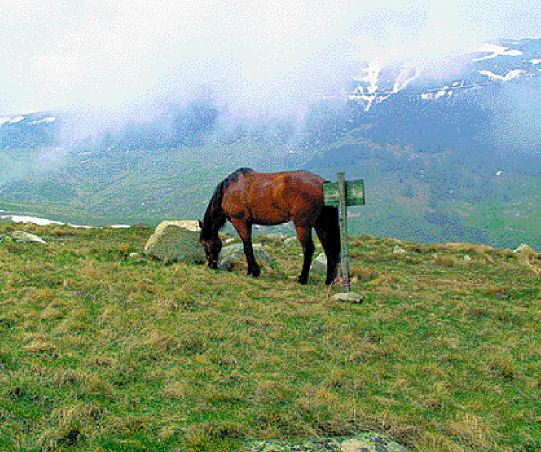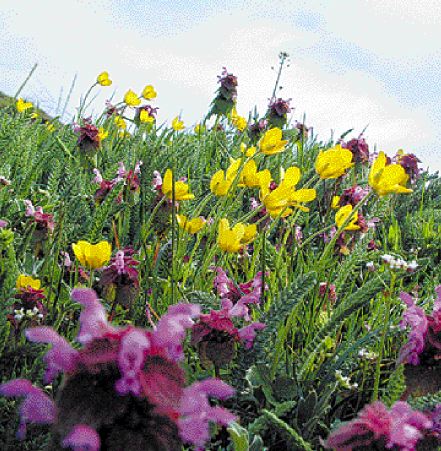 |
||
|
An Adrenaline Rush |
||
|
In the second of a four-part series Penny Turner passes the Prespa, climbs up Vamous and finds herself going circles in an area she thought she knew like the back of her hand. Then she comes across border trafficking As we crossed over Sfika a large flotilla of pelicans, stately and elegant, flew overhead, cream and black against the azure sky. The reason there are still any pelicans in Prespa is because the Society for the Protection of Prespa has saved them. By stubbornly refusing to bow to the inevitable, in a way that is an inspiration and example |
 An atmospheric view of Varnous' in a veil of fog |
|
|
to us all, Myrsini Malakou and her doughty band have made sure that not only are the birds still there, enchanting the place, as Americans might say, but there are lots of them and more every year. Yes, they are thriving and increasing.
I stayed in Prespa for a few days so that George could recover from his allergic attack on the ascent, and then, when he had had a good break, we set off up Varnous. Varnous is on the border with FYROM. Its lower slopes were being grazed down to the stone by an unsustainable number of cattle and a few scrawny ponies. Sfika, on the other hand, which borders Albania, was very grassy indeed. Why? Kiria Maria explained: As a girl she and her family had walked the cattle up from Elassona, where they lived in the winter, to their traditional summer grazing on Sfika. They took about fifteen days to do it. "We grazed the animals on Sfika, we'd take them up there and then leave them more or less to themselves till it was time to go back to Elassona. It is all changed now. We can't leave any animals up on Sfika; they just get stolen. And we daren't stay up there to guard them, it's too dangerous. So we all have to have our cattle on Varnous. The Skopje people, well, they are good people, so it is safe there." But that means that everyone grazes Varnous, and nobody grazes Sfika. It also means that the pasture lands on Sfika are being ploughed up in ill-advised attempts to grow barley, which can't be stolen in border raids. This means chemicals are rashly applied (this may be what George was allergic to) and ecosystems aeons old are being destroyed. |
||
Grazing by horses, sheep and cattle over the millennia has created the spectacular flora that is part of the magic of Prespa. Recently, cattle and horse rustling has become a frightening and uncontrollable factor of life on the borders. As well as changing the life of the local people, who are afraid and feel themselves under siege all the time, it is changing the natural environment. The flora of the area is changing, with Varnous being overgrazed, Sfika undergrazed, or under plough, and the local horses no longer grazing at all. Myrsini and Haris used to keep 15 of the local breed of horses. Until last year these horses were free on the mountains in the summer, and in the winter were fed in the traditional animal pens that you can see in Agios Germanos. |
 George takes his lunch break on the overgrazed Varnous |
|
But last year, among the other horses that disappeared, were eight of their fifteen, including Haris' beloved mare. He had had her all her life. She was devoted to him, and Haris can't bear to think about what her life is like now - she was old and getting frail. Myrsini, no shrinking violet, as any of her friends will testify - this is the woman who provided much of the grit and courage needed to get the governments of the three countries that share the lakes to sign an agreement making them a gift to the world - says that she no longer dares to go riding up in the hills alone or with her little daughter. In fact, everybody I met thought I was taking insane risks travelling alone in these areas. We started the steady climb up Varnous. After a while we came to deep snow drifts blocking our way, but the higher slopes were free of snow, so I decided that we would have to scale the mountainside and then travel along the ridge. Since the sides were extremely steep and, at that place, stony, I decided to get off, so it would be easier for George. |
||
| I jumped down in my usual athletic style, and plummeted through the snow onto a stone, twisted my ankle and fell heavily right under George. He, as ever reliable in a crisis, stood like a statue while I swore and writhed about in agony trying to get upright again. By the time we got to the ridge my foot and ankle were hugely swollen, and I really couldn't do much but hop. A couple of days later we were camped near Agios Antonios. Back on Bitsi, which I persisted in believing I knew like the back of my hand. We set off bright and early, intending to cross over to Klisaura by paths over the mountain. As dusk fell, we were still wandering about in the mist and rain, and were not anywhere near where I had hoped we would be. In fact I had no idea where we were at all, but I stubbornly carried on looking for somewhere that I recognised, some landmark, something. |
 One of many spring landscapes from Penny's travels |
|
| There were hoofprints everywhere, because woodcutters were working in the forest. "That's odd," I thought idly, "someone has got a biggish horse, and what's more he's got him shod like a riding horse..." Of course, the only person with a biggish riding horse in the area was me. Yes, what I was looking at was George's hoofprints. Which meant that we had spent about 11 hours describing a big circle, and were now retracing our steps. In a few hours we would be back where we started from. It was growing dark. I was hobbling along on the downhill as I wanted to save George. The stars came out and the moon rose. In the darkness I heard people shouting. They were obviously signalling among themselves to meet up after hiding out in the forest during the day. Illegal immigrants start to travel as it grows dark, and at any moment they would be on my path, in what, as I could hear from the shouting, was rather large numbers. Probably illogically I found the echoing signals and shouts very alarming. But in my defence, I had spent three weeks hearing nothing but warnings from people who really knew the mountains. and I had found the pistol. And I had constantly met groups of people who were obviously illegally entering Greece, about four or five people every single day. I was mostly not near the main thoroughfare south, had avoided Grammos, the centre of border trafficking, and I was on the move during the day when the majority hide up. Even given all that, I had still met with lots of illegal immigrants. I think we can take it that there is a very considerable problem at the borders. The numbers who came out onto the paths on Bitsi at nightfall are further proof of this. I had thought that things would be different now that it is easier for Albanians to get green cards and work in Greece legally. But, actually, things are worse in some ways. There must be some deeply unpleasant complicit agreement between the type of Greek who prefers to employ Albanians on the black, to save money and to make it easy to cheat them, and the kind of Albanians who come here illegally, determined to make sure, by whatever means, that it is not they who lose out in the illegal arrangements that they are here to collude in. Dog eat dog The people I had been meeting for the last two weeks were very different from the poor wretched people who constantly passed by my hut near Nymphaeon ten years ago. Those poor refugees who, to escape the terrible conditions then current in Albania, used to walk barefoot through the snow in the middle of the ferocious winters you get up there. All of the Albanians I met on this trip could speak Greek. In the old days maybe one member of a group would be able to ask, haltingly, the way to Athens. Nowadays they Know the way. I even got greeted in English. They are better clad. Mostly good shoes - I saw no footprints of people walking over the mountains wearing two left shoes of different sizes, obviously pilfered from outside a shoe stall, no footprints left by barefooted children. The people I met, are taller, healthier and, by all accounts, better armed than they used to be. So, I really didn't want to be on my feet when we met this group of what could well be desperadoes, armed to the teeth. With my leg like it was I couldn't manage to climb onto George without a mounting block of some kind. I felt something near to panic as I failed to see anything I might be able to use. "Shit, shit, shit," I thought, clutching at my Mace spray, my heart thumping in my breast, the voices coming ever closer. Fear is a wonderful stimulus, with the next echoing signal I found I was able to ignore the considerable pain in my ankle and make an adrenaline-fuelled scramble into the saddle; from which vantage place I was able to squeak "Kali nixta kalo taxidi" with, if not insouciance, at least courtesy. Read first article: "Trekking Across Greece's Wild West." [Correction: In the second of Penny Turner's four-part travel series, published on April 21, Rana Ridibunda was described as a Pool frog. It is actually a Marsh frog.] |
||
(Posting date 17 October 2006; Revised 08 November 2006.)
All articles of Athens News appearing on HCS have been reprinted with permission. |
||
|
||
|
2000 © Hellenic Communication Service, L.L.C. All Rights Reserved. http://www.HellenicComServe.com |
||

